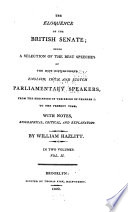 | William Hazlitt - Great Britain - 1809 - 608 pages
...subject. It was so remarkably to the point, that he would quote it. That great man observes, " When the legislative and executive powers are united in the same person, or in the same body of magistrates, there can be no liberty ; because apprehensions may arise lest the... | |
 | Great Britain - 1810 - 538 pages
...let us hear what that able and admirable writer Montesquieu says upon this state of things. " vVhen the legislative and executive " powers are united in the same person, " or in the same body of magistrates, " there can be no liberty ; because ap" prehensions may arise, lest... | |
 | William Cobbett - Great Britain - 1810 - 538 pages
...government be so constituted " as that one man be not afraid of another. " But." says Montesquieu, " when the " legislative and executive powers are '• united in the same person, or in the ' same body of magistrates, there can be ' no Liberty ; because apprehensions ' may arise, lest... | |
 | Alexander Hamilton, James Madison, John Jay - Constitutional history - 1817 - 570 pages
...reasons on which Montesquieu grounds his maxim, are & further demonstration of his meaning. " When the legislative " and executive powers are united in the same person or body,'' says he, " there can be no liberty, because apprehensions may " arise lest the same monarch or senate... | |
 | James Madison, John Jay - Constitutional law - 1818 - 882 pages
...reasons on which Montesquieu grounds his maxim, are a further demonstration of his meaning. " When " the legislative and executive powers are united in the " same person or body," says he, " there can be no " liberty, because apprehensions may arise lest the same tl monarch or senate... | |
 | Charles de Secondat baron de Montesquieu - Jurisprudence - 1823 - 810 pages
...liberty, it is requisite the government be so constituted as one man needs not be afraid oi another. When the legislative and executive powers are united in the same person, or in the same body of magistrates, there can he no liberty ; because apprehensions may arise, lest the... | |
 | William Paley - Ethics - 1835 - 324 pages
...principle generally acceded to 1 And the following reasons for it are given by Montesquieu : " When the legislative and executive powers are united in the same person or body, there can be no liberty ; because apprehensions may arise lest the same monarch or senate should enact... | |
 | Tracts - 1836 - 506 pages
...requisite that the government be so constituted, as that one man need not be afraid of another. •" When the legislative and executive powers are united in the same person, or in the same body of magistrates, there can be no liberty ; because apprehensions may arise lest the... | |
 | Alexander Hamilton, James Madison, John Jay - Constitutional history - 1837 - 516 pages
...reasons on which Montesquieu grounds his maxim, are a further demonstration of his meaning. " When the legislative " and executive powers are united in the same person or body," says he, "there can be no liberty, because apprehensions may " arise lest the same monarch or senate... | |
 | Thomas George Western, Jean Louis de Lolme - Constitutional law - 1838 - 628 pages
...liberty, it is necessary the government be so constituted as that one man be not afraid of another. When the legislative and executive powers are united in the same person, or in the same body of magistrates, there can be no liberty, because apprehensions may arise lest the... | |
| |